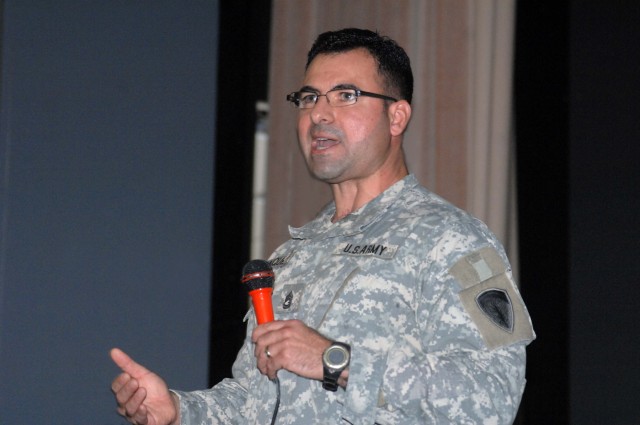
KAISERSLAUTERN, Germany -- Family members are just as important as Soldiers and Department of Defense civilian employees when it comes to protecting the nation's security, said Sgt. 1st Class Nicolas Vazquez, the U.S. Army Europe's operations security program manager, during a presentation here on operations security.
Vazquez travels throughout Europe conducting OPSEC briefings for USAREUR, U.S. Air Forces in Europe, U.S. Naval Forces Europe and U.S. African Command Soldiers and civilian employees -- a job he has done since 2004.
"Everyone -- Soldiers, civilians and family members -- has knowledge that is valuable to the enemy," said Vazquez, a DoD instructor who teaches and certifies OPSEC program managers.
Lately he has been traveling back and forth from Heidelberg to Kaiserslautern to conduct training that meets the Army's annual requirement to complete OPSEC Level I training.
The U.S. Army Garrison Kaiserslautern's Directorate of Plans, Transformation, Mobilization and Security personnel scheduled OPSEC training back to back with Subversion and Espionage Directed Against the U.S. Army refresher training. The training for Soldiers and U.S. and host nation employees is offered in English and German.
"The main reason why we are doing this training is to emphasize and enhance current posture," said Jim Otto, the garrison's antiterrorism officer.
Host nation employees are also encouraged, but not required, to attend OPSEC training, and family members are welcomed to attend both training sessions.
Military intelligence personnel use the SAEDA training sessions to teach how to identify and stop intelligence and terrorist threats to the Army. Security program managers like Vazquez teach OPSEC -- how to identify, control and protect generally unclassified evidence of the planning and execution of sensitive activities, such as deployments and long hours at work.
Jeff Crisp, the DPTMS director, is sold on the value of the training.
"Any time that you can remind people to look, notice and report anything suspicious it's important for security, because people reporting things is how we stop terrorist acts and save lives," Crisp said. "Always be on the defense -- detect, deter, disrupt."

Social Sharing